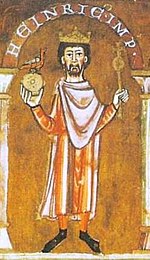Henry IV, Holy Roman Emperor, Date of Birth, Place of Birth, Date of Death
TweetHenry IV, Holy Roman Emperor
Holy Roman Emperor
 Date of Birth: 11-Nov-1050
Date of Birth: 11-Nov-1050
 Place of Birth: Goslar, Lower Saxony, Germany
Place of Birth: Goslar, Lower Saxony, Germany
Date of Death: 07-Aug-1106
Profession: politician
Zodiac Sign: Scorpio 
About Henry IV, Holy Roman Emperor
- Henry IV (German: Heinrich IV; 11 November 1050 – 7 August 1106) was Holy Roman Emperor from 1084 to 1105, king of Germany from 1054 to 1105, king of Italy and Burgundy from 1056 to 1105, and duke of Bavaria from 1052 to 1054.
- He was the son of Henry III, Holy Roman Emperor, and Agnes of Poitou.
- After his father's death on 5 October 1056, Henry was placed under his mother's guardianship.
- She made grants to German aristocrats to secure their support.
- Unlike her late husband, she could not control the election of the popes, thus the idea of the "freedom of the church" strengthened during her rule.
- Taking advantage of her weakness, Archbishop Anno II of Cologne kidnapped Henry in April 1062.
- He administered Germany until Henry came of age in 1065. Henry decided to recover the royal estates that had been lost during his minority.
- He employed low-ranking officials to carry out his new policies, causing discontent in Saxony and Thuringia.
- Henry crushed a riot in Saxony in 1069 and overcame the rebellion of the Saxon aristocrat, Otto of Nordheim in 1071.
- The appointment of commoners to high offices offended German aristocrats, and many of them withdrew from Henry's court.
- He insisted on his royal prerogatives relating to the appointment of bishops and abbots, although the reformist clerics condemned this practice as simony (a forbidden sale of church offices).
- Pope Alexander II blamed Henry's advisors for his acts and excommunicated them in early 1073.
- Henry's conflicts with the Holy See and the German dukes weakened his position and the Saxons rose up again in the summer of 1074.
- He took advantage of a rift between the Saxon aristocrats and peasantry and forced the rebels into submission in October 1075. Henry adopted an active policy in Italy, alarming Pope Gregory VII who threatened him with excommunication for simony.
- Henry persuaded most of the German bishops to declare the Pope's election invalid on 24 January 1076.
- In response, the Pope excommunicated Henry and released his subjects of allegiance.
- To prevent the Pope from sitting in judgement on him at the German leaders' assembly, Henry went to Italy.
- His penitential "Walk to Canossa" was a success.
- Gregory VII had no choice but to absolve him in January 1077.
- Henry's German opponents ignored his absolution and elected an antiking, Rudolf of Rheinfelden, on 14 March 1077.
- The Pope was initially neutral in the two kings' conflict, enabling Henry to consolidate his position.
- Henry continued to appoint high-ranking clerics, for which the Pope again excommunicated him on 7 March 1080.
- Most German and Lombardian bishops remained loyal to Henry and they elected an antipope, Clement III.
- Rudolf of Rheinfelden was killed in battle and his successor, Hermann of Salm, could only exert royal authority in Saxony.
- From 1081, Henry launched a series of military campaigns to Italy, and Clement III crowned him emperor in Rome on 1 April 1084. Hermann of Salm died and Henry pacified Saxony with the local aristocrats' assistance in 1088.
- He launched an invasion against the pope's principal Italian ally, Matilda of Tuscany, in 1089.
- She convinced Henry's elder son, Conrad, to take up arms against his father in 1093.
- Her alliance with Welf I, Duke of Bavaria prevented Henry's return to Germany until 1096 when he was reconciled with Welf.
- After Clement III's death, Henry did not support new antipopes, but he did not make peace with Pope Paschal II.
- Henry proclaimed the first Landfrieden (or imperial peace) which covered the whole territory of Germany in 1103.
- His younger son, Henry V, forced him to abdicate on 31 December 1105.
- He tried to regain his throne with the assistance of Lotharingian aristocrats, but became ill and died without receiving absolution from his excommunication.
Read more at Wikipedia

